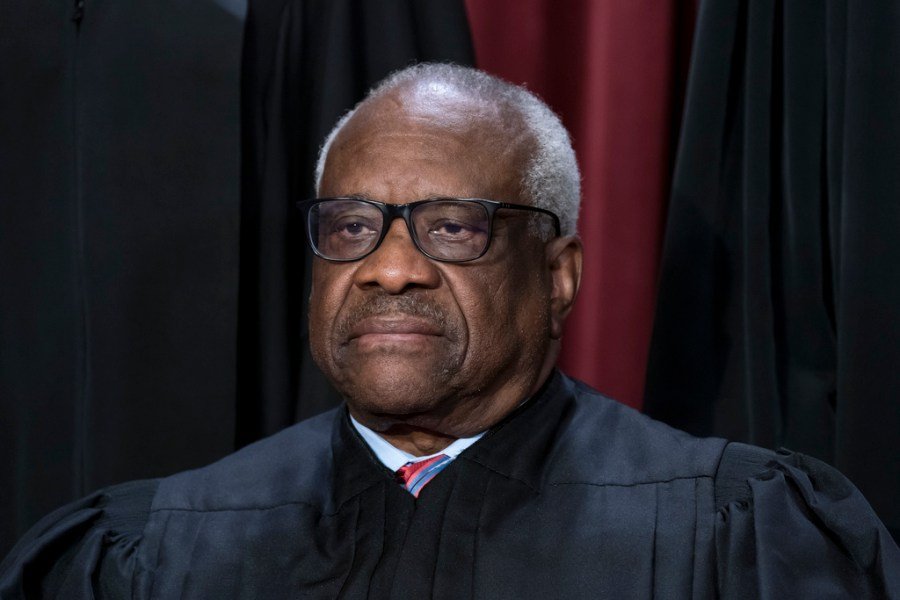
Was Amy Coney Barrett a “DEI hire” to the Supreme Court?
That’s what President Trump’s MAGA acolytes have been saying since his State of the Union Address last March, when Barrett allegedly glared at him as he walked down the aisle. The next day, she sided with the court’s liberal justices in rejecting the Trump administration’s bid to freeze nearly $2 billion in foreign aid.
“She is evil, chosen solely because she checked identity politics boxes,” right-wing activist Mike Cernovich posted on X. “Another DEI hire. It always ends badly.”
But the real DEI hire on the Supreme Court — chosen solely because of identity politics — isn’t Barrett. It’s Clarence Thomas.
There, I said it. But so did every honest observer back in 1991, when George H. W. Bush nominated Thomas for the court. Bush claimed that Thomas was the “best qualified” candidate for the seat vacated by Thurgood Marshall. But the real reason Bush selected him was that Thomas, like Marshall, is Black.
Thomas knew it, too. Ten years before he joined the court, while serving as assistant secretary for civil rights in the Department of Education, he reportedly told a colleague that he had set his sights on Marshall’s seat. In 1981, the Yale-educated Thomas was already the highest-ranking Black attorney in the federal government. Marshall “wouldn’t last forever,” Thomas said, and no one was in “as good a position” to replace him as Thomas was.
The year after that, President Ronald Reagan appointed Thomas to chair the U.S. Equal Opportunity Commission. He won accolades from conservatives for condemning affirmative action, which he called “belittling to minorities.” At Yale, he said, everyone assumed he was admitted because of his race rather than his merit. So long as Black people received special consideration, Thomas argued, they would be dismissed as “second rate.”
Behind the scenes, that’s exactly what White House officials said about him. He was passed over for a judgeship on the D.C. Court of Appeals because the Justice Department said his legal scholarship was weak.
But when George H. W. Bush replaced Reagan, things changed. A country-club Republican, Bush was eager to burnish his reputation among the right-wing rank-and-file. So he appointed Thomas to the D.C. Court of Appeals and even considered nominating him for the Supreme Court when liberal lion William J. Brennan stepped down.
Don’t do it, Bush’s advisers counseled. Thomas had never litigated a case before a jury, they noted, and he hadn’t issued any substantive constitutional opinions during his brief stint on the appeals court.
Bush instead chose David Souter, who disappointed conservatives. But when Marshall announced his retirement the following year, Thomas got the nod. He had the requisite right-wing credentials. And he would become the next African American justice, which would insulate him from criticism on the left.
The strategy worked. Democrats were afraid to attack Thomas’ legal philosophy too harshly, lest they be perceived as racist. And when Thomas faced sexual harassment accusations from his former aide, Anita Hill, he famously denounced his confirmation hearing as a “high-tech lynching.”
That worked, too. America has an ugly history of violence against African American men, often triggered by false reports of sexual misconduct. Although Hill’s charges were entirely credible, nobody wanted to be seen as dragging another Black man through the mud.
No matter what Thomas says about race, then, it clearly helped him secure a place on the Supreme Court. And it’s fair to say that gender gave Barrett an advantage, too. Just as Thomas replaced an African-American on the court, Barrett followed Ruth Bader Ginsburg. And even before he nominated Barrett, Trump announced that he would appoint a woman to Ginsburg’s seat.
But unlike Thomas, Barrett was a legal superstar. She graduated first in her class at Notre Dame Law School and clerked for Supreme Court Justice Antonin Scalia, whose other clerks routinely describe her as the sharpest of the bunch.
She is also conservative, of course. Barrett voted to overturn Roe v. Wade, reverse affirmative action and expand gun rights. And let’s not forget that she signed on to an opinion granting Trump immunity for official acts he takes as president.
But she has also crossed Trump several times this term, which makes her a turncoat in the eyes of his disciples. In addition to bucking his freeze on foreign aid, Barrett joined an opinion that said Trump couldn’t deport Venezuelan migrants under the Alien Enemies Act of 1798.
That led one right-wing activist to denounce her as — wait for it — “Amy Commie Barrett.” That’s an absurd moniker for someone so obviously conservative.
So is the idea of Barrett as a “DEI hire,” if that means someone who used identity — not merit — to get to the top. Yes, her gender might have helped her along the way, but her legal skills are beyond doubt, no matter what you think of her decisions.
And nobody on the Supreme Court got a bigger boost from identity than Thomas. If you don’t believe me, simply listen to the man who chaired his Senate confirmation hearing: “Had Thomas been white, he never would have been nominated,” declared Joe Biden, who would later displace Trump from the White House. “The only reason he is on the court is because he is Black.”
Sounds like another DEI hire, chosen to check the right boxes. But it’s so much easier to ignore that fact and flay Barrett. It will end badly for her two-faced critics — it always does.
Jonathan Zimmerman teaches history at the University of Pennsylvania and serves on the advisory board of the Albert Lepage Center for History in the Public Interest.






